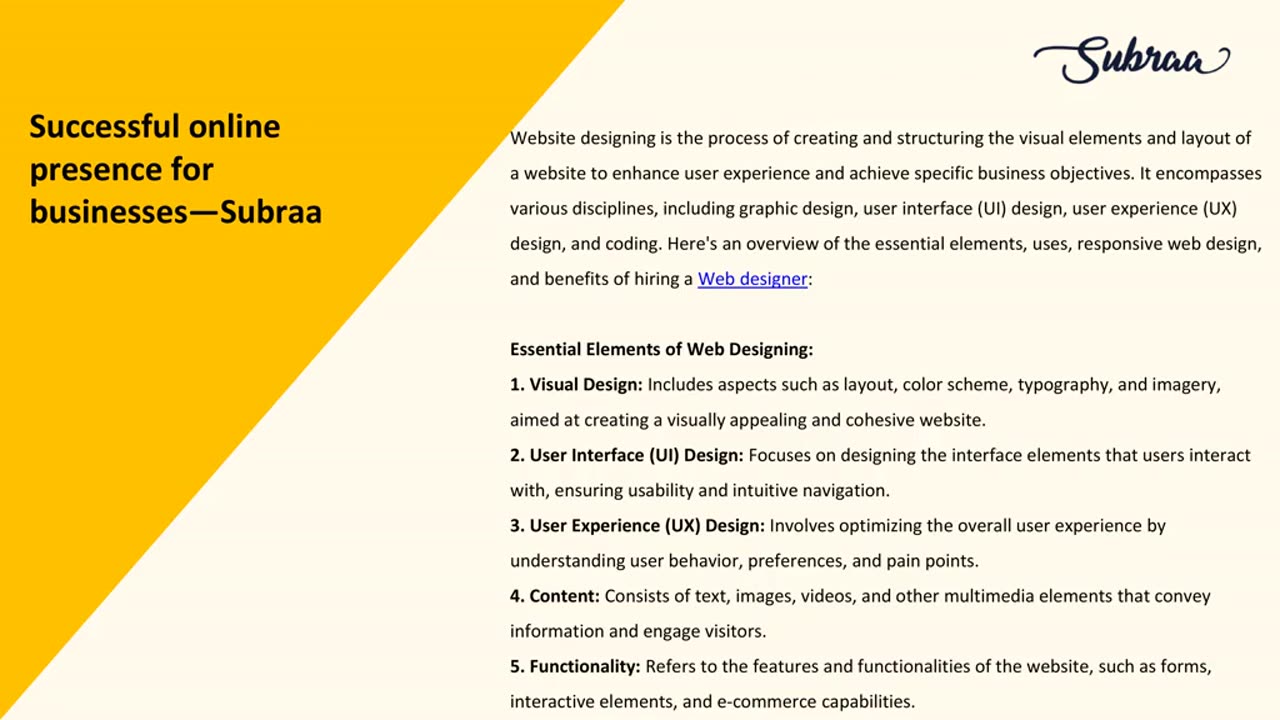Premium Only Content

Successful online presence for businesses — Subraa
Website designing is the process of creating and structuring the visual elements and layout of a website to enhance user experience and achieve specific business objectives. It encompasses various disciplines, including graphic design, user interface (UI) design, user experience (UX) design, and coding. Here’s an overview of the essential elements, uses, responsive web design, and benefits of hiring a Web designer:
Essential Elements of Web Designing:
1. Visual Design: Includes aspects such as layout, color scheme, typography, and imagery, aimed at creating a visually appealing and cohesive website.
2. User Interface (UI) Design: Focuses on designing the interface elements that users interact with, ensuring usability and intuitive navigation.
3. User Experience (UX) Design: Involves optimizing the overall user experience by understanding user behavior, preferences, and pain points.
4. Content: Consists of text, images, videos, and other multimedia elements that convey information and engage visitors.
5. Functionality: Refers to the features and functionalities of the website, such as forms, interactive elements, and e-commerce capabilities.
Uses of Website Designing:
1. Building Brand Identity: A well-designed website helps businesses establish a strong brand identity and communicate their values and offerings effectively.
2. Generating Leads and Sales: An optimized website can attract and convert visitors into leads or customers, driving business growth and revenue.
3. Providing Information: Websites serve as a central hub for providing information about products, services, company details, contact information, and more.
4. Enhancing Credibility: A professionally designed website instills trust and credibility in visitors, making them more likely to engage with the business.
5. Facilitating Communication: Websites can serve as a platform for communicating with customers, answering queries, and providing support through features like chatbots, contact forms, and FAQs.
Responsive Web Design:
Responsive web design ensures that websites adapt seamlessly to different screen sizes and devices, providing a consistent and optimized user experience across desktops, laptops, tablets, and smartphones. It improves accessibility, increases mobile traffic, and enhances SEO, leading to higher conversion rates and improved user satisfaction.
Benefits of Hiring a Web Designer:
1. Professionalism: Web designers bring expertise and creativity to the table, ensuring that your website reflects your brand’s professionalism and attention to detail.
2. Customization: A web designer can create a custom website tailored to your specific needs, preferences, and target audience, helping you stand out from competitors.
3. Time and Cost Savings: Hiring a web designer saves you time and effort, allowing you to focus on other aspects of your business. It also eliminates the need for costly trial and error.
4. Technical Expertise: Web designers possess the technical skills and knowledge necessary to optimize your website for performance, security, and search engine rankings.
5. Ongoing Support and Maintenance: A web designer can provide ongoing support and maintenance services, ensuring that your website remains up-to-date, secure, and functional.
In conclusion, website design is a crucial aspect of creating a successful online presence for businesses. By incorporating essential elements, embracing responsive design, and leveraging the expertise of a Web designer, businesses can create visually appealing, user-friendly, and effective websites that drive results and support their growth objectives.
Know More: https://www.subraa.com/
-
 LIVE
LIVE
Man in America
6 hours agoThe Final Battle: Nanotech, Transhumanism & the War for Your Soul w/ Dr. Ed Group
789 watching -
 UPCOMING
UPCOMING
Sarah Westall
36 minutes agoUpcoming World Wide Economic Collapse/Deep Recession & What the Big Money is Doing w/ Ed Dowd
1 -
 LIVE
LIVE
Barry Cunningham
1 hour agoIT'S MOVIE NIGHT WITH BARRY!
4,280 watching -
 31:05
31:05
The Why Files
2 days agoPeru's Most Terrifying Mystery | The Face Peelers
20.1K39 -
 1:32
1:32
Gaming on Rumble
9 hours agoWhat is the Rumble Creator Program?!?! | Lvl UP
12.4K4 -
 LIVE
LIVE
Flyover Conservatives
21 hours ago9/11 on Steroids: What’s Coming This Fall? - Bo Polny | FOC Show
756 watching -
 1:01:28
1:01:28
Precision Rifle Network
7 hours agoS4E27 Guns & Grub - Let's Talk About Gas Guns
5.65K1 -
 59:29
59:29
The Charlie Kirk Show
3 hours agoTHOUGHTCRIME Ep. 96 — The Great Flag Burning Debate
32.2K16 -
 57:56
57:56
The Mel K Show
2 hours agoMel K & General Mike Flynn | Betrayal of a Nation: Soros’ NATO World Order | 8-28-25
20.2K18 -
 LIVE
LIVE
Joker Effect
1 hour agoInterviewing BEN JAMMINS! A personality with over 1 BILLION gif views. Let's give him a warm welcome
448 watching